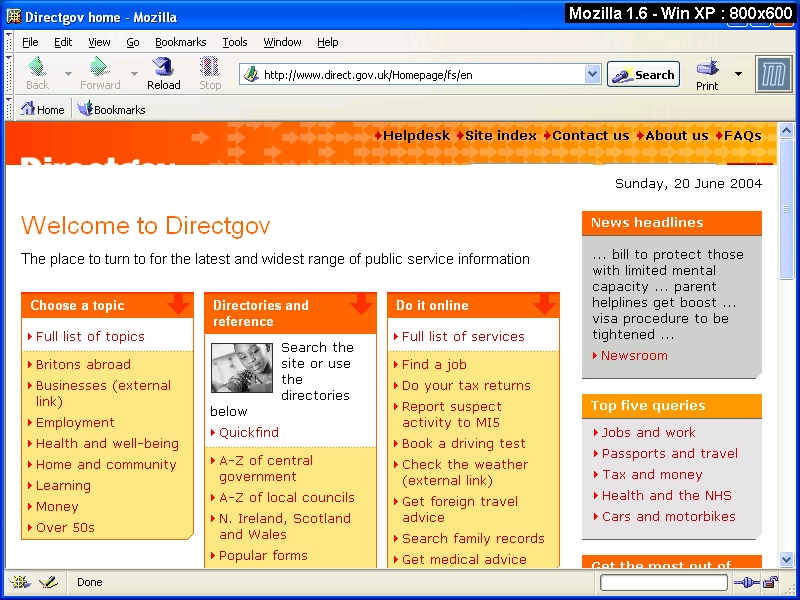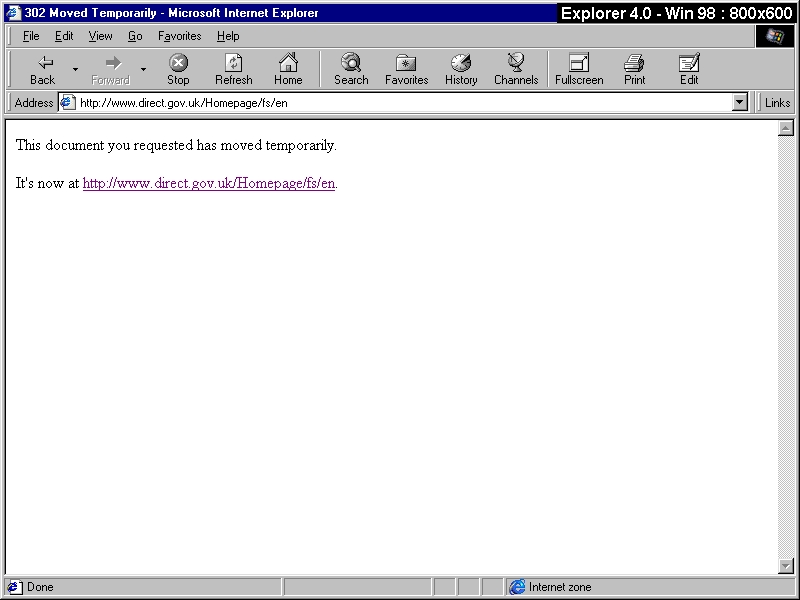Mailing Number 36 - 31 May 2004
196 subscribers on publication date. 24242 page-views since publication.
An always useful guide - Stephen Downes, Canada. There is something for everyone in these mailings - Jane Knight's e-Learning Centre, UK. Recommended reading - Caroline Kotlas - CIT Infobits, USA.
Please send
me feedback directly about these mailings, concerning content,
design, or material I ought to feature in the future. You can also
send me anonymous feedback using the radio buttons at the bottom of this
page. If you think others will find these mailings useful or interesting,
you can use this form to tell them.
| Site Home ||
Mailings Home
|| News/comment | Resources | Oddments | Feedback |
News/comment
BBC Creative Archive. Like many similar publications, Fortnightly Mailing is issued under a Creative Commons license, which permits reuse of what I write for non-commercial purposes provided I am credited, and provided that if someone alters or build on "my" stuff, they distribute the resulting work under the same terms. The Creative Commons License has been embraced by big and influential organisations as well as self-publishers, for example all of MIT's OpenCourseWare is published this way. On 26/5/2004 the BBC announced that its Creative Archive (covered previously in Fortnightly Mailing Numbers 32 and 34 will be published under a similar license. The BBC's decision has won strong praise from Stanford University Law School's Lawrence Lessig, who chairs the Creative Commons project.
The announcement by the BBC of its intent to develop a Creative Archive has been the single most important event in getting people to understand the potential for digital creativity, and to see how such potential actually supports artists and artistic creativity. If the vision proves a reality, Britain will become a centre for digital creativity, and will drive the many markets - in broadband deployment and technology - that digital creativity will support.
BBC press release. Example Creative Commons license. Lawrence Lessig's web site.
Managing Information Across Partners (MIAP). The Department for Education and Skills (DfES) has a project to standardise the way in which awarding body data on assessments and achievements passes between providers, DfES, and its partners. For a rather sketchy overview, see this recent MIAP update [500 kB PDF]. For further information, which extends into documents about the so-called Unique Learner Number, see these results from a cross-departmental search on the term MIAP using Directgov.
One-day workshop about Moodle - an open source learning environment. On 15 July, the Association for Learning Technology (for whom I work half-time) will run a one day workshop about Moodle, in London at Goldsmiths, University of London - prices: 80 UKP for ALT members; 150 UKP for non-members. Moodle is being used at thousands of sites worldwide, and in a major way by several UK institutions, including Goldsmiths and Wiltshire College, one of the counry's largest Further Education colleges.
Guidelines for Authors of Learning Objects. Thanks to Dave Pickersgill for sending me this 32 page guide for authors of learning objects [1.6 MB PDF], from the Canadian New Media Consortium. A companion web site is due to be launched during June 2004.
Browsercam. Dick Moore mentioned Browsercam, a very sophisticated tool which solves, at a stroke (and at a reasonable cost, with scope to try it out for nothing), the problem of seeing how a web page looks when viewed on the very wide range of possible combinations of operating system, browser, browser version, and device. Here, for example, is how Browsercam renders the home page of the recently launched flagship UK Directgov web site (of which more later), as it would be seen by users of two different combinations of browser, operating system, and device.

Fig 1. Browsercam image of Directgov home page viewed using Mozilla 1.6 and Windows XP, showing banner title truncated and site search window not accessible

Fig 2. Browsercam image of Directgov home page viewed using Internet Explorer 4 and Windows 98
Recent US study reports on e-learning. The Masie Centre has published 4 pieces of contract research on different aspects of e-learning. Each is available as a full report and as an executive summary.
Directgov. Having criticised a design flaw in Directgov, the new site deserves credit for the way it draws together information from across the whole of UK Government in a coherent and pleasing-on-the-eye manner. Directgov offers the facility to do a single search across a big range of public sector web sites, for example JISC, the British Library, and the Department of Trade and Industry, though it would be helpful if the site listed somewhere the main sites which are included. Try it.
Two interesting resources via the Centre for Educational Technology Interoperability Standards (CETIS)
Spoof email disclaimer. I enjoyed this award-winning spoof email disclaimer from The Register, which sits alongside several other real ones, all of them from 2001.
If you have found this page from my web site, or with a search tool, and want to receive your own mailing directly from now on, you can sign up for a subscription.
If you are a subscriber, and no longer wish to be, please use this form to unsubscribe.
If you think others will find these mailings interesting,
you can use this form to tell
them.
Last updated - 21/6/2004; © Seb Schmoller, but licensed under
a Creative Commons
License.
| Mailings
Home || Site Home
| Privacy
|

|